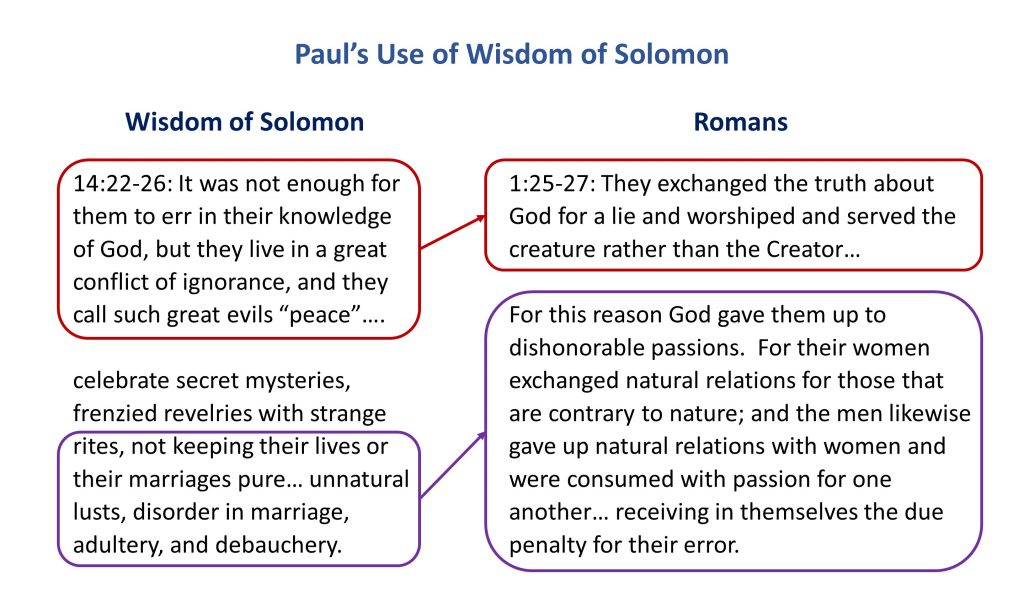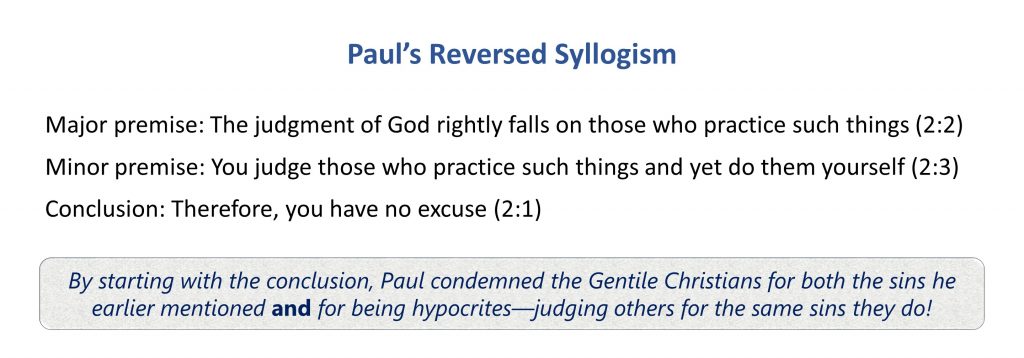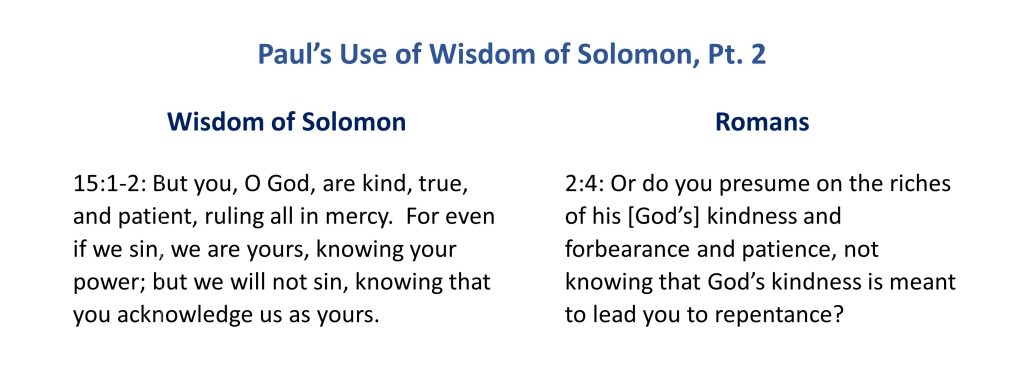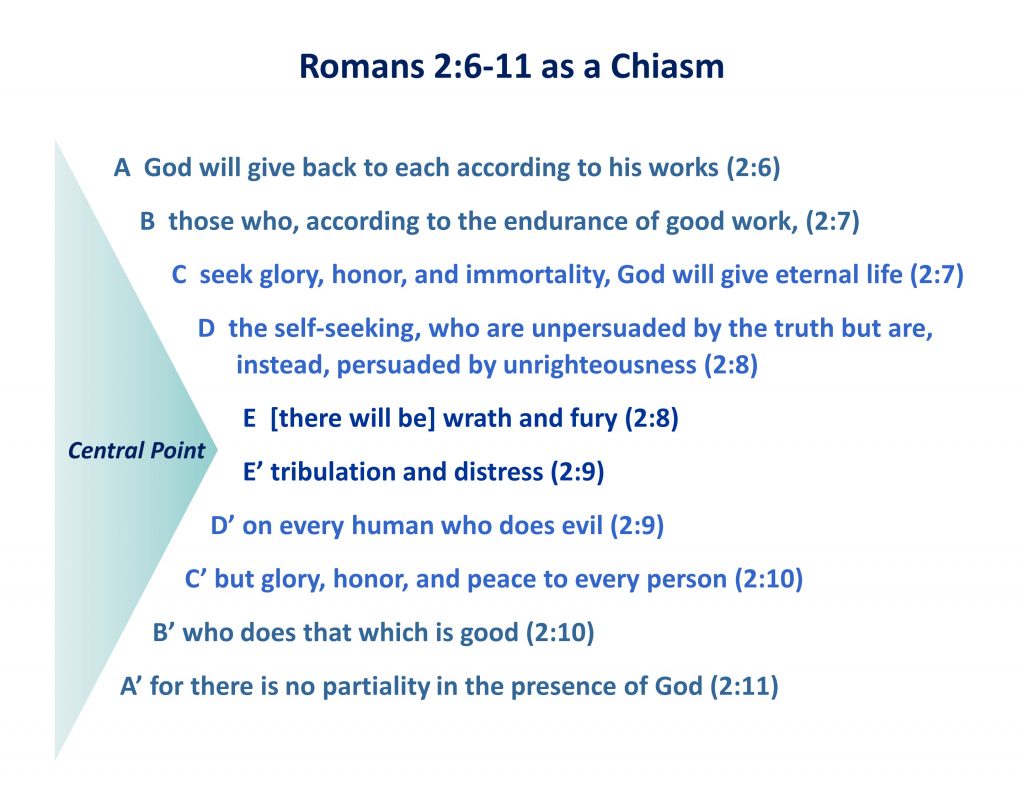 Paul is dealing with both Jewish works-righteousness and Gentile sinful license. Against works-righteousness, he drew from Isaiah 51, affirming that salvation IS the righteousness of God. Against sinful license, he adapted from the Apocrypha book of Wisdom as a foil to confront sin: If pagans have no excuse before God, how much more so for the Gentile Christians at Rome.
Paul is dealing with both Jewish works-righteousness and Gentile sinful license. Against works-righteousness, he drew from Isaiah 51, affirming that salvation IS the righteousness of God. Against sinful license, he adapted from the Apocrypha book of Wisdom as a foil to confront sin: If pagans have no excuse before God, how much more so for the Gentile Christians at Rome.
In a series of cause-and-effect statements, Paul says that if they, Gentile Christians, refuse to acknowledge God, He will also hand them over to their sin. We now look at the ending of Paul’s first cause-and-effect statement.
Effect: Part 1
Earlier, Paul wrote that they (Pagan Gentiles) knew God existed from creation. Even so, “they did not honor him as God” but, instead, worshiped aspects of the creation instead of the Creator. Paul now gets to the result of what happens when we shape our worldview instead of God.
Read Romans 1:24
- What is the result?
- Although Paul is talking about the unbelieving Pagan, who is he really “targeting” within the Roman congregation?
- So, what are some of the Gentile Christians then doing?
Cause and Effect: Part 2
Paul continues to adapt from Wisdom, now chapter 14, repeating and reinforcing what he earlier said.
Read Romans 1:25
- What were they (Gentile Pagans) guilty of doing?
Read Romans 1:26-27
- What was the result?
- How can homosexuality be the result?
“contrary to nature”: Greek, phusis for “nature,” meaning “contrary to biology.” Phusis is the root for our word “physical,” through Latin. The Greek-language Old Testament only uses this word in the Apocrypha book of Wisdom: 7:20, 13:1, and 19:20. Last week, we looked at Paul adapting Wisdom 13:1 in Romans 1:21, bringing out the result of the fall into sin.
- Wisdom 13:1: All were ignorant of God and foolish in their condition [phusis, in their biological foolishness].
- Romans 1:21: They became futile in their thinking, and their foolish hearts were darkened.
The point is this: If we exchange the “truth of God for a lie” (Romans 1:25), anything can result. Without God shaping our conscience, anything can result because we are corrupted biologically from the fall into sin. Homosexual attraction and acts are but an example of this.
Paul is targeting the Gentile Christians. Evidence from the ancient world reveals that the Jews’ works-righteousness to the Old-Covenant Law kept their practice of homosexuality to a minimum.
Biology should teach us that homosexuality makes no sense. But apart from God, all bets are off. Paul will further develop what happens when we decide what is right according to our fallen biology.
- It seems out of place within the flow of Romans for Paul suddenly to bring up homosexuality. For this not to be out of place, what can we infer is taking place with some Christians at Rome?
- For the pagans in Wisdom, what were their “unnatural lusts” associated with?
- What is the implication for the Gentile Christians who are participating in “unnatural lusts”? How much more are they without an excuse since such acts are not part of Christian worship?
Cause and Effect: Part 3
Read Romans 1:28a
“did not see fit to acknowledge God”: literally, “refused to hold God in knowledge.” This is a rejection of God and His teachings.
- What is the source of the sins, which Paul will soon list?
Read Romans 1:28b-31
“God gave them up to a debased mind”: “gave them up,” literally “handed them over.” This is God honoring someone wanting to live life without Him. “Debased mind,” literally “not-stand-the-test mind.” Without God and what He gives, our fallen nature cannot “stand the test.” Think of Satan putting Jesus to the test in His temptations in the wilderness (Matthew 4:7, Luke 4:12).
- Of all the sins that Paul lists, what is at the root of them all?
- Thus, is Paul’s list exhaustive or just some examples?
Read Romans 1:32
Here, we see Paul begin to transition.
- How do “they” know such acts are wrong—in the present tense, at Rome?
- Thus, who is Paul really targeting in the congregation at Rome with this verse?
Paul Springs the Trap
Paul now transitions into Chapter 2 with a “therefore,” connecting what preceded earlier with where he now goes. He differentiates this section from Romans 1:18-32 by making what was earlier directed at “them” and makes it personal, “you.”
Because homosexuality was part of what Paul earlier condemned, we know this section still continues speaking to the Gentile Christians.
Read Romans 2:1
- How were the Gentile Christians hypocritical?
“O man”: An interjection with the singular “you.” Context applies this to the Gentile Christians. The singular “you” prevents someone from applying Paul’s stern word of censure to another.
Read Romans 2:2-3
- How do we know that God’s judgment falls on those who practice such things? (Hint: This is more Paul’s extrapolation of “by nature,” phusis.)
Paul reverses the normal may of making a point (through a syllogism). He does this, not only to apply Romans 2:1 to what preceded it (the examples of sins listed in chapter 1) but also to what follows.
Read Romans 2:4-5
- What is God’s kindness meant to lead us to do?
- The Law lets us know God’s will for us, but it does not empower someone to do it. What then gives the Christian the ability to live in a God-pleasing way?
- How does Paul adapt Wisdom to become “plan B” for the Christian? (If the Gospel doesn’t lead one to live in a God-pleasing way, it first empowers the Christians to do what?)
Read Romans 2:5
- If God is the “power source” for repentance and living in a way that pleases Him, what is the cause of our impenitence (lack of repentance and choosing to live in a sinful way)?
- What is the result of such impenitence? When?
God Shows No Partiality
Read Romans 2:6
Paul quotes Psalm 62:12 from the Septuagint, changing “you” to “he” [God].
“render”: Greek, apodidomi, “give back.” This is God giving back to you the righteousness of the works you give to Him on the Last Day. This ultimately points back to the source of your good works.
- If God “gives back” to you works based on you and who you are by “nature” (phusis), what will be the result?
- If God “gives back” to you works based on His righteousness, what will be the result?
Read Romans 6:7-11
- Discuss the difference between seeking immortality and meriting it.
- Discuss the difference between seeking immortality (vs. 7) and self-seeking (vs. 8).
“no partiality”: Greek, prosopolampsia. The first time “partiality” is used as a noun in Greek is in the New Testament! This word grows out of this phrase in the Septuagint: prosopon labein (literally, to “receive a face”) in Leviticus 19:15: “You will do no injustice in judgment. You will not be partial (prosopon labein) to the poor or defer to the mighty. You will judge your neighbor in righteousness.”
Not even our works can serve as a “bribe” to sway Him. Deuteronomy 10:17-18: “For the LORD your God is God of gods and Lord of lords, the great God, mighty and awe-inspiring, who shows no partiality (LXX: thumazei prosopon, “marvel at a face”) and takes no bribe.”
Impartiality is the most-basic expression of “righteousness” when one judges another.
- What is Paul’s main point for those who take God’s grace as a license to sin?
Next week: Paul will show how God shows Himself to be impartial.
Click here to go the the next Lesson..





